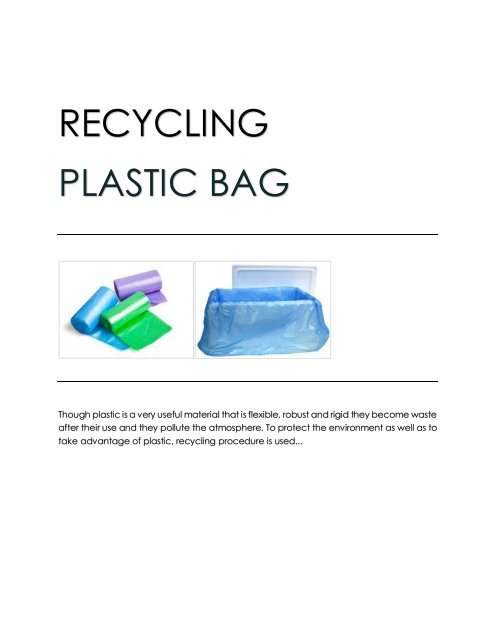Recycling Plastic Bag
Plastic is a common material that is now widely used by everybody in this world. Plastic is used in many ways as it is light weight and compact. The maintenance required is little. Common plastic items that are used are bags, bottles, containers and food packages. Whenever you buy grocery, food or any other item from any store, you will use plastic bags for carrying them.
Plastic is a common material that is now widely used by everybody in this world. Plastic is used in many ways as it is light weight and compact. The maintenance required is little. Common plastic items that are used are bags, bottles, containers and food packages. Whenever you buy grocery, food or any other item from any store, you will use plastic bags for carrying them.
You also want an ePaper? Increase the reach of your titles
YUMPU automatically turns print PDFs into web optimized ePapers that Google loves.
RECYCLING<br />
PLASTIC BAG<br />
Though plastic is a very useful material that is flexible, robust and rigid they become waste<br />
after their use and they pollute the atmosphere. To protect the environment as well as to<br />
take advantage of plastic, recycling procedure is used...
<strong>Plastic</strong> is a common material that is now widely used by everybody in this world. <strong>Plastic</strong><br />
is used in many ways as it is light weight and compact. The maintenance required is<br />
little. Common plastic items that are used are bags, bottles, containers and food<br />
packages. Whenever you buy grocery, food or any other item from any store, you will<br />
use plastic bags for carrying them.<br />
Uses of <strong>Plastic</strong><br />
<strong>Plastic</strong>s are widely used in:<br />
<br />
<br />
<br />
<br />
Packaging industry<br />
Construction industry<br />
Disposable cutlery<br />
Storage, etc.<br />
The ease of use of plastic items has made plastic a great success.<br />
Where does the Problem Lie?<br />
The great problem with plastic is its disposal. <strong>Plastic</strong> is made of polymer chemicals and is<br />
not bio degradable. This means that plastic will not decompose when it is buried. When<br />
plastic is burnt it emits harmful chemicals. These chemicals have adverse effects on the<br />
environment. Hence, the need of recycling arises.<br />
<strong>Recycling</strong><br />
<strong>Recycling</strong> means making new products out of the waste materials. All types of plastics<br />
cannot be recycled. If we recycle the ones that can be, the environment will be saved<br />
to some extent. <strong>Plastic</strong> recycling involves the process of recovering scrap plastic and<br />
this waste plastic is then reprocessed to form new materials that may be different from<br />
their original state. Compared to other materials like glass and metal, recycling of<br />
plastic is expensive and complex. This is due to the high molecular weight of the large<br />
polymer chains that build the plastic material. Heating plastic doesn't dissolve the<br />
polymer chains and hence a tedious and complex process is essential. Different types<br />
of plastic cannot be mixed together because they phase separate. Such a resulting<br />
melting product cannot be recycled to make another plastic product. While making<br />
plastic products many fillers like dues and other additives are used. These fillers cannot
e separated from the plastic using inexpensive techniques. This makes the process<br />
more complex.<br />
Advantages of <strong>Recycling</strong><br />
<strong>Recycling</strong> plastic has many advantages.<br />
<br />
<br />
<br />
<br />
Use of non-renewable fossil fuels is reduced by<br />
recycling as manufacturing new plastic<br />
materials require more of these fuels.<br />
Consumption of energy is also reduced as<br />
already prepared plastic is recycled for new use.<br />
Amount of plastic that reach the landfill sites are<br />
greatly reduced. This will eliminate land pollution<br />
to some extent.<br />
Carbon emissions are reduced as manufacturing units emit more carbon.<br />
Inverse Polymerization Process<br />
The common process that is used for recycling polymers is the inverse polymerization<br />
process where the polymers in the plastic are converted into initial monomers that were<br />
used in the manufacture. These chemicals are then purified and synthesized to form<br />
new plastic materials. Assorted polymers are converted into petroleum in another<br />
process. The advantage of this process is that any mix of polymers can be used. A new<br />
process generates heat from the friction of plastic materials which melts the plastics. This<br />
is then pumped into casting molds. The great advantage of this technique is that all<br />
types of plastics can be recycled.
Basic Steps Involved in <strong>Recycling</strong><br />
The basic steps that are involved in the recycling of plastic are;<br />
Step 1: Collecting plastic waste from households as well as industrial wastes as<br />
well.<br />
Step 2: Sorting the plastic waste in different categories such as PET bottles, bags,<br />
containers, etc.<br />
Step 3: The <strong>Plastic</strong> is cut into tiny pieces.<br />
Step 4: The tiny pieces are thoroughly washed for any dirt or unwanted particles<br />
on them.<br />
Step 5: The washed pieces are melted and poured into small containers for<br />
reuse.<br />
To aid the process, plastics come with plastic identification code to identify the different<br />
polymers that are used in the manufacture of plastic. The process must be started from<br />
home. When you have utilized that plastic item for its use you can use the same item for<br />
something else. For example, if you buy a juice bottle you can use the plastic bottle as<br />
a storage container for reusing the pet bottle.<br />
Everybody must also be aware of the recycling plant in the locality and must bring the<br />
waste plastic to the plant.<br />
Read more: Buzzle<br />
Photo Credit: Polypac



